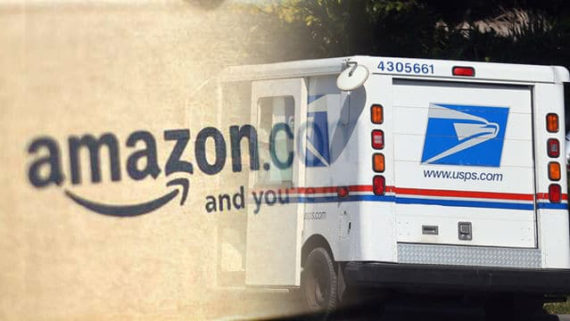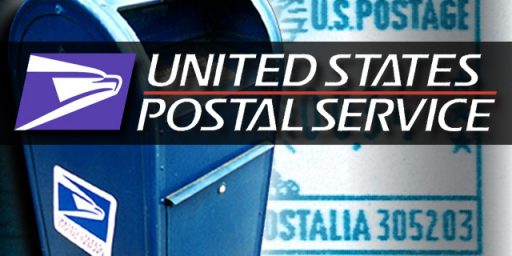Trump To Postmaster General: Raise Rates On Amazon
President Trump continues his unhinged, and unsupported by facts, war on Amazon and its owner Jeff Bezos by pressuring an independent agency to raise shipping rates.

The Washington Post is reporting that President Trump personally pressured the Postmaster General to crack down on the rates the U.S. Postal Service is charging to deliver packages for Amazon:
President Trump has personally pushed U.S. Postmaster General Megan Brennan to double the rate the Postal Service charges Amazon.com and other firms to ship packages, according to three people familiar with their conversations, a dramatic move that probably would cost these companies billions of dollars.
Brennan has so far resisted Trump’s demand, explaining in multiple conversations occurring this year and last that these arrangements are bound by contracts and must be reviewed by a regulatory commission, the three people said. She has told the president that the Amazon relationship is beneficial for the Postal Service and gave him a set of slides that showed the variety of companies, in addition to Amazon, that also partner for deliveries.
Despite these presentations, Trump has continued to level criticism at Amazon. And last month, his critiques culminated in the signing of an executive order mandating a government review of the financially strapped Postal Service that could lead to major changes in the way it charges Amazon and others for package delivery.
Few U.S. companies have drawn Trump’s ire as much as Amazon, which has rapidly grown to be the second-largest U.S. company in terms of market capitalization. For more than three years, Trump has fumed publicly and privately about the giant commerce and services company and its founder Jeffrey P. Bezos, who is also the owner of The Washington Post.
Trump alleges that Amazon is being subsidized by the Postal Service. He has also accused The Post of being Amazon’s “chief lobbyist” as well as a tax shelter — false charges. He says Amazon uses these advantages to push bricks-and-mortar companies out of business. Some administration officials say several of Trump’s attacks aimed at Amazon have come in response to articles in The Post that he didn’t like.
The three people familiar with these exchanges spoke on the condition of anonymity because they were not authorized to discuss the White House’s internal deliberations.
Brennan and Trump have met at the White House about the matter several times, beginning in 2017, and most recently four months ago, the three people said. The meetings have never appeared on Trump’s public schedule. Brennan has spent her career at the Postal Service, starting 32 years ago as a letter carrier. In 2014, the Postal Service’s Board of Governors voted to appoint her as postmaster general.
Clouding the matter even further, Trump’s aides have also disagreed internally about whether Amazon is paying enough to the Postal Service, with some believing the giant commerce company should be paying more, while others believe that if it weren’t for Amazon, the Postal Service might be out of business, according to the three people.
Trump has met with at least three groups of senior advisers to discuss Amazon’s business practices, probing issues such as whether they pay the appropriate amount of taxes or underpay the Postal Service, according to the three people.
These groups include Treasury Secretary Steven Mnuchin, then-National Economic Council Director Gary Cohn and Domestic Policy Council Director Andrew Bremberg. Bremberg has served as a key liaison with Brennan.
One of Amazon’s biggest defenders within the White House was Cohn, who had told Trump that the Postal Service actually made money on the payments Amazon made for package delivery. Cohn announced his departure from the White House in March.
(…)
Details of Amazon’s contract with the Postal Service are secret, making it difficult for financial experts to assess claims about the relationship. Amazon has said that publicly releasing the contract, which contains detailed information on the company’s delivery systems, would give competitors an unfair advantage.
Amazon primarily uses the Postal Service for the “last mile” of its deliveries. It brings the packages to the post office closest to the final destination, and then the Postal Service takes it from there. The Postal Service says other companies also have “last-mile” agreements with it but declined to name them.
Amazon is the leading player in e-commerce but competes with other retail giants such as Walmart, Macy’s and Costco to offer fast and inexpensive delivery of products. The Postal Service competes with UPS, FedEx and others for delivery.
Amazon said it spent $21.7 billion on shipping costs in 2017, a figure that includes sorting, delivery center and transportation costs. Roughly 40 percent of its packages are delivered by the Postal Service, according to some analysts, a figure neither Amazon nor the Postal Service have confirmed. It is not known how much Amazon pays the Postal Service each year and what percentage of its items are shipped via the Postal Service.
The Postal Service, meanwhile, reported shipping and package income of $19.5 billion last year, an 11.8 percent increase from one year before. This increase wasn’t enough to stop the Postal Service from losing money for the eleventh straight year.
(…)
In January, Postal Service spokesman David Partenheimer wrote an op-ed in the Hill newspaper pushing back against calls for it to raise package rates.
“Some of our competitors in the package delivery space would dearly love for the Postal Service to aggressively raise our rates higher than the marketplace can bear — so they could either charge more themselves or siphon away postal customers,” he wrote. “. . . The Postal Service is a self-funding public institution that generates its revenue from the sale of postal products and service, we compete for every customer across all of our product categories, and we exist for the benefit of American businesses and consumers.”
President Trump has been on something of an irrational rant against Amazon and its relations with the USPS for several months now, alleging in tweets stretching back to last year that the online sales giant is somehow taking advantage of the Postal Service in the agreement that the two companies have had in place for the past several years. Rather than being based in a rational or fact-based critique of a contract that he probably hasn’t even read, though, it’s been apparent from the beginning that the main motivation for his war on Amazon is due to the fact that the company is owned by Jeff Bezos, who also owns The Washington Post and is, depending on how you measure it, the first or second wealthiest individual in the world. Trump’s ire against Amazon appears to be based both in the fact that he doesn’t like the coverage he gets from the Post and because of his long-established ego and jealousy toward anyone who is wealthier than he is.
The problems facing the Postal Service are long-standing, and have nothing to do with its delivery deal with Amazon. As noted in the article linked above, the USPS has been losing money for at least the past 11 years. Most recently, it reported that the agency lost $1.3 billion in just the first three months of this year. Its current contract with Amazon, which greatly expanded the extent to which Amazon utilized the Postal Service for “last mile” delivery and resulted in increased business for the service that has led it to expand package delivery to what essentially amounts to a seven-day-a-week service, has only been in place for the past five years or so. Clearly, then, the problems facing the USPS run far deeper than a contract with Amazon.
I detailed some of those problems in a post last week:
One of the primary factors, of course, is the aforementioned federal law that requires the Postal Service to pre-fund all of its retired employee obligations, including both pension and health care obligations, rather than operating under a pay-as-you-go system as most business entities do. This regulation is due, of course, to the lobbying power of the unions for postal workers who wanted to ensure that their employee’s benefits would be guaranteed notwithstanding the fact that the USPS was separating itself from the Federal Government. This has added billions of dollars per year to USPS obligations at a time when its revenues are being squeezed due to other factors.
The primary factor driving down revenue, of course, is the sharp drop in the use of first-class mail that has resulted from the rise of fax machines ranging from fax machines to email to the Internet, all of which have drastically cut down on the volume of mail that the USPS handles outside of packages and bulk mail such as so-called “junk” mail. In my case, for example, it’s hard to remember the last time I actually mailed something, whether it be a letter, a card, or, well, anything that requires using stamps or going to the Post Office.
As I also noted in that post, there are several things that Congress could do to help the USPS get beyond its financial difficulties:
One would be to repeal the law requiring pre-funding of pension and health-care obligations, although that’s likely to face objections from union lobbyists. Another would be to provide more autonomy to the USPS to allow it to make ordinary business decisions without having to get Congressional approval. Several years ago, for example, Postal Service advisers stated that they could save billions per year by eliminating one day of first-class delivery, with most suggesting that the day that would be eliminated would be either Saturday, when many businesses that are expecting mail delivery are closed anyway, or Tuesday which, because of the weekends, is apparently typically the lowest volume delivery day of the year. In order to do this, though, they would need to get Congressional approval, and Congress responded to the idea by passing legislation that further limits the ability of USPS to make cost-cutting moves such as this. A final solution would be to lift many of the regulations that require the USPS to deliver first-class mail for the same rate anywhere in the United States regardless of the cost associated with the delivery. On some level, it is absurd that it costs me as much to deliver a letter to that would go to a location 30 minutes away from me as it would to send a letter to someplace thousands of miles away such as Alaska or Hawaii. No other delivery company does this, and the USPS is not required to do it for overnight mail or package delivery. Given the fact that first-class mail is a dying line of business anyway, if not already a dead one, this regulation is utterly silly.
Additionally, it’s worth noting that demanding that the USPS substantially increase the rates it charges Amazon or any other bulk shipper will inevitably backfire, and likely lead to a decline in revenue rather than the increase that Trump apparently believes it would. The relationship that the USPS has with Amazon and other bulk shippers is one of the few lines of business where it actually seems to be making money rather than losing it, and there are already signs that this relationship isn’t going to last forever. Amazon, for example, has been spending the last couple years researching alternative methods of “last mile” deliver that would bypass the USPS entirely. Perhaps the biggest threat comes from the fact that the company is already developing its own delivery infrastructure, using drones, and even using couriers to deliver packages to your car wherever it may be parked. Once they’ve got those methods perfected, they’re likely to decide that they don’t need to use USPS for “last mile” delivery as much as they are now, and they’ll reduce their reliance on the Postal Service accordingly. Absent reforms, that will only mean that the losses the USPS is suffering on an annual basis will increase.
On a final note, one must of course make note of the utter impropriety of what President Trump is doing here. Going to war against a successful American business is bad enough, of course, but doing so because the President doesn’t like the press coverage he gets from a news outlet that just happens to be owned by the same person who owns the controlling interest in Amazon is even worse. Of course, for Trump it’s really nothing new and part and parcel of the contempt that he has shown for the news media and for freedom of the press. It’s also worth noting that Postmaster General is not a position that is subject to Presidential authority to begin with. Ever since the reforms put in place by the reforms adopted in the 1970’s, this has been a position that was appointed by the USPS’s Board of Governors, not by the President. Additionally, the Postmaster General is no longer a member of the President’s Cabinet as had been the case from 1829 to 1971. The current Postmaster General is Megan Brennan, who began her career with the USPS as a letter carrier in Lancaster, Pennsylvania and worked her way up the ranks into supervisory and management positions before being appointed in 2015. In any case, the USPS is at least ostensibly meant to be an agency that operates outside of the ability of the President to dictate policy in this manner and it is entirely inappropriate for the President to be pressuring the agency in this manner as part of what is clearly just a political war against a newspaper and a personal vendetta against someone who has been far more successful in business than Trump can ever hope to be. Of course, as I’ve observed so many times before, this is the Age of Trump. None of the old rules apply anymore and none of the supporters or sycophants in the Republican Party seem to care.






(Sigh) . . . Yet another episode of, “I’m the President, you can’t confuse me with facts.”
You remember when the GOP went nuts because of allegations that the IRS was targeting Obama’s political opponents? Now Trump’s trying to get the Post Office to attack a political opponent. If it were anyone other than Trump, this would be a red-flashing-light headline on Drudge. This is abuse of power, plain and simple.
Another case of public policy based on lies. What could go wrong?
Or Guam. 6000+ miles from Los Angeles. First Class Letter 50 cent. (They really need a stamp with his mug on it.)
On the other hand, right now you can just stick a stamp on a letter and throw it with a mailbox without having to go to the post office and stand in line for an hour to get the exact right stamp you need for that particular letter.
Trump still doesn’t believe he can’t do business the sleazy way he did it when he was sitting in the Trump Tower rather than the Oval Office.
@Stormy Dragon: Good point. And I think the original idea was that location-based pricing would mean citizens out in the territorial boonies would be effectively priced out of receiving mail, which at the time was the principal means of long-distance communication. Now obviously today that could be altered, but it’s hard to see much benefit.
@teve tory:
I suppose we could still maintain some sort of subsidy to ensure service for rural areas and such, but given that we’re fast approaching an age where even those parts of the country won’t need the mail as much as they used to.
In my case, First Class Mail is largely an anachronism, and if it weren’t for the Amazon and other packages and the junk mail, I’d get no mail at all. Heck, some weeks I can do three or more days without any mail in the box.
Something Trump would understand if he ever worked a day in his life….raise the USPS rates on Amazon and Amazon will seek out alternatives to using the USPS.
Amazon needs to start delivering cheeseburgers in under 30 minutes. They need only advertise on Fox News.
On a more serious note, should a government agency be allowed to make secret contracts? I’d understand if some military supply contracts were secret, but not those of the post office.
This and the ZTE deal herald a new state of the American government. Trump will not be President forever, but none of his successors of either party are going to be saints. We can expect that the next three or four Presidents will continue to push the envelope until the Presidency becomes a juicy way to enrich the officeholder and punish those that offend him. As long as we have the bitter polarization that we have now, the President will have a solid base of support to do what he wants…shoot a man on Fifth Avenue for instance.